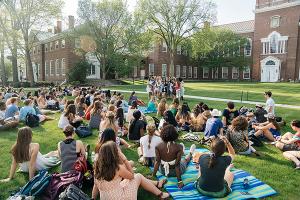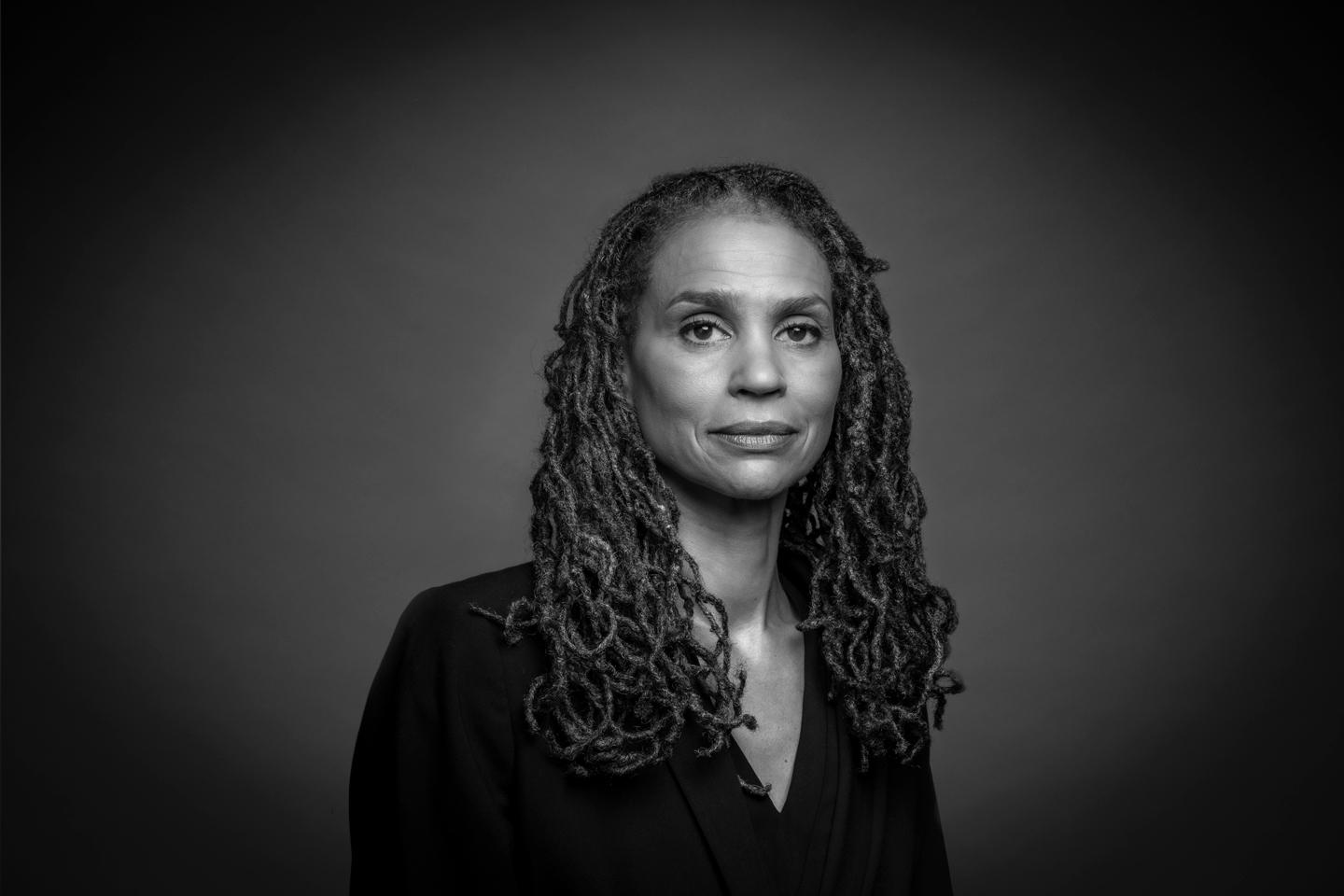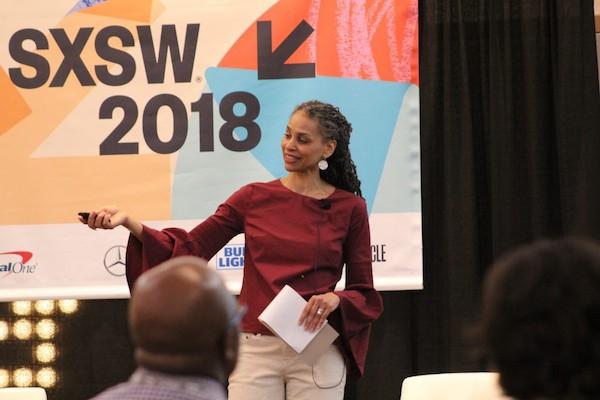
Dartmouth College Fund: Financial Aid
In uncertain times, one thing is certain: Dartmouth stands by our students. Give now to help students in this moment.
Maya Wiley ’86 is a nationally renowned civil rights expert who has litigated, lobbied U.S. Congress, and developed programs to transform structural racism in the U.S. and South Africa. She is a university professor at The New School, where she founded and co-directs the Digital Equity Laboratory. Maya recently stepped down as legal analyst for MSNBC and is considering running for mayor of New York City.

We spoke with Maya about racial justice, how we can build a more just society, and how Dartmouth shaped her as a leader.
We need bold, transformational leaders—leaders who recognize that systemic racism in the U.S. goes much deeper than the police brutality we have seen and can reimagine a society that values everyone, especially the disadvantaged and oppressed. We also need leaders who will make those imaginings real.
Demonstrators across our country want fundamental change. That requires government and people sitting down and actually talking things through.
We also need to do a better job problem-solving together as a society. For example, on the topic of policing, we need to be willing to ask the questions, “If we had no police department, what would that look like? How would you feel safe? What does civilian-controlled policing look like?” Those are the questions that government should be asking, but is often afraid to ask real people.
Looking back, Dartmouth absolutely shaped me as a leader. I spent my formative years in a large Black community in D.C. and went to an all-Black public school. The racism I encountered at Dartmouth was not something I had dealt with before. I remember the first incident: I received the Dartmouth Review and it had an article that was a tirade against affirmative action. It basically said that if you didn’t have a certain SAT score, you were not qualified to be there and were lowering the quality of a Dartmouth education. Because of moments like that—passive aggression, aggressive-aggression—I thought about transferring. But I remember my mother reminding me, “You’re not leaving because you said this was something you had to learn to deal with.”
So I became active on campus. I joined the Afro-American Society. I helped found an all-Black sorority, Delta Sigma Theta. I was involved in the anti-apartheid movement. I also had a terrific experience studying abroad, staying with a middle-class French family in Lyon who had very liberal views on race, in a place that had a lot of racial tension between the French and Algerians. But an important part of my social and emotional growth at Dartmouth was finding my support networks. The faculty were a huge part of my educational experience—they were also very supportive. I learned how to stay at Dartmouth, to remain true to what I cared about, and appreciate it as a positive growth experience. That is something I draw on all of the time. Because leadership is challenging.
I took a course with a politically-conservative professor, Rogers Elliott, in psychology called Law and Society. Professor Elliott was very conservative and we got into some major debates in class about affirmative action and whether white people are perfectly able to identify Black people appropriately at a criminal trial. We disagreed a lot, and he loved these debates. One day he told me, “I’m going to write one of your law school recommendations.” I didn’t ask him, he just did it. It was a wonderful surprise. Here was a white male conservative telling me this. That was incredible.
Professor Elliott’s class taught me how to confront and maintain my sense of self and my values. He taught me a very important lesson: life is not always about agreement, and there are people in the world you can disagree with and still find a relationship with them. This lesson has guided me throughout my life.

Maya Wiley speaks about digital equity at a SXSW event at the New School in New York City.
One real, immediate need this country has is better internet access, particularly for disadvantaged and immigrant communities. That need has been heightened during the pandemic. At The New School, I created the Digital Equity Laboratory so graduate students could engage in solutions to this problem, working with community and government partners. They worked on research and implementation projects in Detroit and New York with Black, Latino, and Asian communities to create what we call a “digital sanctuary” where people have broadband access.
You look at a city like Detroit, where there is a history of lack of investment because it’s a Black city. You see it clearly as you cross the city line and suddenly there’s no broadband. But you see people self-organizing to create community wireless networks and learning how to maintain them. In my earlier experience working on broadband access for people of color as counsel to Mayor DeBlasio, we brought government together with the communities that were solving these problems themselves. These are solutions and conversations that don’t happen unless they’re organized.
One of my most rewarding and complex leadership experiences was chairing the New York City Civilian Complaint Review Board for the New York Police Department. It is an independent oversight agency that reviews cases of police misconduct and makes recommendations for disciplinary measures. You’re also looking for patterns of bad behavior and writing up public reports and advocating with the NYPD on possible solutions to bad patterns.
It’s about being fair and straightforward with the NYPD and really listening to their concerns, and listening to the community, then proposing solutions that are the best, in the long run, for the public. It was so important for me to listen closely to the NYPD if they thought something was wrong or unfair. I had to really sit down and say, “All right. Let me think about whether that’s true.” It was very challenging, particularly when policing has so many issues and there was so little trust or relationship between police and the community. It was a great challenge to learn to build solutions around very charged issues. But in the end, what mattered most and could not be compromised was justice.
This saying is core to me—it’s an ethos that both of my parents instilled in me. They showed me how important it is to put everything that has been given to you in action to make other people’s lives better.
This is the time we need leaders to take action. The demonstrations we’ve seen this past year show, I think, that people are demanding a more active, democratic conversation with government, to talk together to address inequity and racial injustice.
I am considering a run for mayor of New York because the world's greatest city deserves bold, transformational government. We need to create a New York where we can all afford to live with dignity. We do that by bringing more, and more diverse, voices to the table to be the city that has it all: all races, all religions, all types of people; where no matter who we are or how we see ourselves, we can find a home here in the city that never sleeps but always dreams. We can rise from the ashes of the twin pandemics of the Coronavirus and of systemic racism by redesigning our programs and policies in ways that make them innovative and responsive to all of our communities.
I owe a lot to my Dartmouth experience. My time at Dartmouth taught me how to stay true to myself and my values. It also taught me how to build bridges with those with different perspectives. Maybe most importantly, my time at Dartmouth taught me the importance of drawing on the bonds of community to find strength, courage, and inspiration.